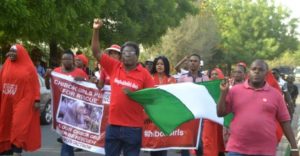Kano (Nigeria) (AFP) – Nigeria is negotiating with the help of “foreign entities” for the remaining kidnapped Chibok girls held by Boko Haram Islamists, a presidential spokesman said Thursday.
As the country prepares to mark the third anniversary of the mass kidnapping on Friday, Garba Shehu told the BBC in a radio interview there were ongoing negotiations to release the 195 girls believed still be being held by Boko Haram.
“Talks are ongoing through other means with the help of some foreign entities to free more schoolgirls,” Shehu said during an interview with BBC Hausa.
“These talks are going on with the help of some countries. You can recall the 21 schoolgirls were freed with the help of the International Committee of the Red Cross (ICRC) and Swiss government officials who got involved in the negotiations. These two have not withdrawn their support in the negotiations,” Shehu said.
“There are also other countries that are lending support to the negotiations by being involved in the talks,” Shehu added.
In October last year, 21 girls were freed after negotiations between Boko Haram and the Nigerian government brokered by the ICRC and the Swiss government, said the presidency.
Boko Haram seized 276 students from the Government Girls Secondary School in Chibok on April 14, 2014. Fifty-seven managed to escape in the immediate aftermath while three others were found or rescued by the military. Some had babies in captivity.
“(The) government is in constant touch through negotiations, through local intelligence to secure the release of the remaining girls and other abducted persons unharmed,” Nigerian President Muhammadu Buhari said in a statement on Thursday.
“On this solemn occasion, my appeal is that we must not lose hope on the return of our remaining schoolgirls.”
In Nigeria’s capital Abuja and the commercial hub of Lagos, Bring Back Our Girls campaigners are preparing to march on Friday to mark the anniversary of the kidnapping.
The Chibok schoolgirls became a symbol of the Boko Haram insurgency that began in 2009 and has left at least 20,000 people dead in northeast Nigeria.
Despite a military fight-back, villages near Chibok, which is 125 kilometres (80 miles) by road from the Borno state capital, Maiduguri, have seen a wave of suspected Boko Haram attacks in recent months.
Garba Shehu was not available for comment Thursday when contacted by AFP.





